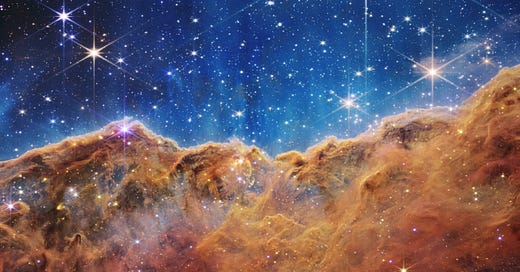Expert Proposes the Universe Might Think
If true, then there is far more than just a visual resemblance between the Universe and our brain
Hiya!
Have you noticed how the more we observe and learn about Nature, the more we notice that Nature repeats patterns and techniques? For instance, the fractal patterns of lighting strikes are similar to how tree branches look. Similar, too, are aerial views of our waterways — creeks becoming streams, becoming rivers, all flowing toward the ocean. And again, the same patterns can be found in how our blood flows through our veins and arteries.
In other words, when Nature finds something that works, she uses it again and again and again. Since we, humans, are uniquely talented at noticing patterns, we’ve discovered dozens of them. These patterns help us learn about our world and our solar system, and now we’re finding ways to explore the entire Universe. As our knowledge grows, some experts have found some new patterns. This time between our brains and the Universe, which leads some experts to wonder if the Universe thinks.
Comparisons Between the Brain and the Universe
A simple visual comparison such as the image below shows a striking resemblance between the Universe and the brain. The image on the left shows a neuronal network in the brain of a mouse. On the right is the “evolution of matter distribution in a cubic region of the Universe over 2 billion light-years.”

Then in 2020, Italian astrophysicist Franco Vazza and Neuroscientist Alberto Feletti published a study that rocked the scientific world. Their research revolved around analyzing similarities between the Universe and the brain, and after some careful calculations, the duo discovered a “remarkable similarity” between the number of structures in the human brain’s neural pathways and the number within the cosmic web.
They found that the distribution of matter within 1 millimeter of brain tissue basically mirrors the distribution of matter within around 300 million light-years of Space. Considering this information, a research fellow at the Frankfurt Institute for Advanced Studies in Germany, Sabine Hossenfelder, wonders in her book Existential Physics whether the universe could be “a giant brain in which our galaxy is merely one neuron.”
Keep reading with a 7-day free trial
Subscribe to Curious Adventure to keep reading this post and get 7 days of free access to the full post archives.



